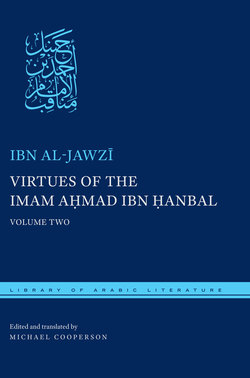Читать книгу Virtues of the Imam Ahmad ibn Ḥanbal - Ibn al-Jawzi - Страница 2
На сайте Литреса книга снята с продажи.
Оглавлениеمناقب
أبي عبد الله أَحمد بن محمّد بن حنبل
المجلّد الثاني
من تأليف
أبي الفرج عبد الرحمن بن عليّ بن محمّد بن الجوزيّ
Virtues of the Imām Aḥmad ibn Ḥanbal
Volume Two
Ibn al-Jawzī
Edited and translated by
Michael Cooperson
Volume editor
Tahera Qutbuddin
NEW YORK UNIVERSITY PRESS
New York and London
Table of Contents
Letter from the General Editor
Virtues of the Imām Aḥmad ibn Ḥanbal
Chapter 51: His Love of Poverty and His Affection for the Poor
Chapter 52: His Humility
Chapter 53: His Accepting Invitations and His Withdrawal upon Seeing Things He Disapproved Of
Chapter 54: His Preference for Solitude
Chapter 55: His Wish to Live in Obscurity and His Efforts to Remain Unnoticed
Chapter 56: His Fear of God
Chapter 57: His Preoccupation and Absentmindedness
Chapter 58: His Devotions
Chapter 59: His Performances of the Pilgrimage
Chapter 60: His Extemporaneous Prayers and Supplications
Chapter 61: His Manifestations of Grace and the Effectiveness of His Prayers
Chapter 62: The Number of Wives He Had
Chapter 63: His Concubines
Chapter 64: The Number of His Children
Chapter 65: The Lives of His Children and Descendants
Chapter 66: How and Why the Inquisition Began
Chapter 67: His Experience with al-Maʾmūn
Chapter 68: What Happened after the Death of al-Maʾmūn
Chapter 69: His Experience with al-Muʿtaṣim
Chapter 70: His Reception by the Elders after His Release, and Their Prayers for Him
Chapter 71: His Teaching of Hadith after the Death of al-Muʿtaṣim
Chapter 72: His Experience with al-Wāthiq
Chapter 73: His Experience with al-Mutawakkil
Chapter 74: His Refusing Ibn Ṭāhir’s Request to Visit Him
Chapter 75: What Happened When His Two Sons and His Uncle Accepted Gifts from the Authorities
Chapter 76: Some Major Figures Who Capitulated to the Inquisition
Chapter 77: His Comments on Those Who Capitulated
Chapter 78: Those Who Defied the Inquisition
Chapter 79: His Final Illness
Chapter 80: His Date of Death and His Age When He Died
Chapter 81: How His Body Was Washed and Shrouded
Chapter 82: On Who Sought to Pray over Him
Chapter 83: The Number of People Who Prayed over Him
Chapter 84: The Praising of the Sunnah and the Decrying of Innovation That Took Place during His Funeral Procession
Chapter 85: The Crowds That Gathered around His Grave
Chapter 86: His Estate
Chapter 87: Reactions to His Death
Chapter 88: Reaction to His Death on the Part of the Jinns
Chapter 89: On the Condolences Offered to His Family
Chapter 90: A Selection of the Verses Spoken in Praise of Him in Life and in Commemoration of Him in Death
Chapter 91: His Dreams
Chapter 92: Dreams in Which He Appeared to Others
Chapter 93: Dreams in Which He Was Mentioned
Chapter 94: The Benefit of Visiting His Grave
Chapter 95: The Benefit of Being Buried Near Him
Chapter 96: The Punishments That Befall Anyone Who Attacks Him
Chapter 97: What to Think about Anyone Who Speaks Ill of Him
Chapter 98: Why We Chose His Legal School over the Others
Chapter 99: On the Excellence of His Associates and Successors
Chapter 100: His Most Prominent Associates and Their Successors from His Time to Our Own
[Colopha]
Glossary of Names and Terms
Bibliography
Further Reading
About the NYU Abu Dhabi Institute
About this E-book
About the Editor-Translator
Library of Arabic Literature
Editorial Board
General Editor
Philip F. Kennedy, New York University
Executive Editors
James E. Montgomery, University of Cambridge
Shawkat M. Toorawa, Cornell University
Editors
Julia Bray, University of Oxford
Michael Cooperson, University of California, Los Angeles
Joseph E. Lowry, University of Pennsylvania
Tahera Qutbuddin, University of Chicago
Devin J. Stewart, Emory University
Managing Editor
Chip Rossetti
Digital Production Manager
Stuart Brown
Assistant Editor
Gemma Juan-Simó
Letter from the General Editor
The Library of Arabic Literature series offers Arabic editions and English translations of key works of classical and pre-modern Arabic literature, as well as anthologies and thematic readers. Books in the series are edited and translated by distinguished scholars of Arabic and Islamic studies, and are published in parallel-text format with Arabic and English on facing pages. The Library of Arabic Literature includes texts from the pre-Islamic era to the cusp of the modern period, and encompasses a wide range of genres, including poetry, poetics, fiction, religion, philosophy, law, science, history, and historiography.
Supported by a grant from the New York University Abu Dhabi Institute, and established in partnership with NYU Press, the Library of Arabic Literature produces authoritative Arabic editions and modern, lucid English translations, with the goal of introducing the Arabic literary heritage to scholars and students, as well as to a general audience of readers.
Philip F. Kennedy
General Editor, Library of Arabic Literature
